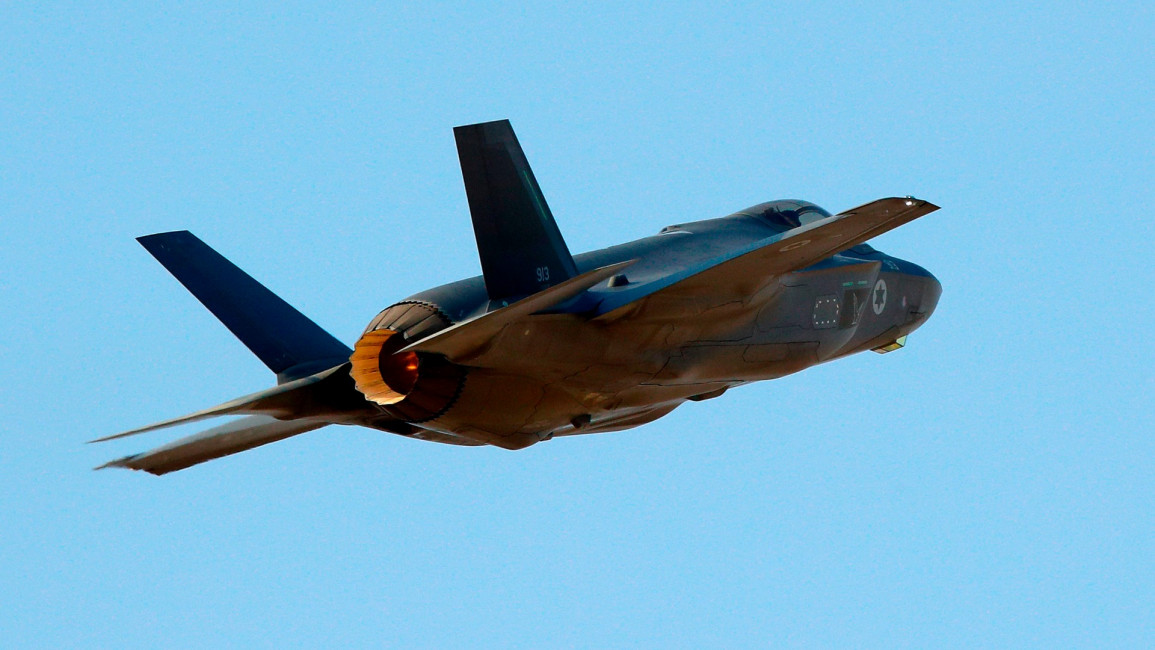Follow us on Facebook, Twitter and Instagram to stay connected
UAE could secure US F-35 deal by December, but Israel would obtain superior aircraft: report
UAE could secure US F-35 deal by December, but Israel would obtain superior aircraft: report
Israelis have opposed the UAE's planned purchase of cutting-edge fighter jets from the US.
3 min read
The F-35 fighter jet is a key target of the UAE [Getty]
The UAE and US could strike an agreement on the purchase of F-35s by the end of the year, a Reuters report has revealed, despite strong opposition in Israel against Washington's sale of the cutting-edge fighter jet to Abu Dhabi.
The UAE wants the deal done in time for its National Day celebrations on 2 December, with the Trump administration trying to find ways to secure Israel's acquiesce to the sale.
This could mean supplying the UAE with inferior F-35s to ensure that Israel's "qualitative military edge" over its Arab rivals is maintained.
Lockheed Martin could also make the Lockheed Martin Corp LMT.N F-35 more visible to Israeli radar systems, as another way round Israeli resistance to the deal.
Reuters could not verify whether this means better detection equipment will be supplied to Israel or the Emirati jets will be modified to ensure they are visible to Israeli radars.
A Pentagon spokeswoman told the agency that "as a matter of policy, the United States does not confirm or comment on proposed defence sales or transfers until they are formally notified to Congress".
The UAE embassy in Washington did not comment on the issue.
A minister in the Israeli defence ministry, Michael Biton, said that his country could still "preserve the relative defensive advantage" even if the UAE purchases the F-35.
Israel has around 24 F-35s while no Arab country has the fighter jet.
Due to the bureaucratic hurdles in place it might not be possible to tie up the deal by the end of the year, Reuters reported.
Ellen Lord, the Pentagon's chief weapons buyer, said that a letter of agreement for the new fighter jet usually takes around six months to complete.
The US often maintains superior weapons technology when selling arms to other countries, including the F-35.
"It's the computing power that allows you to sell a higher tech jet to Israel than to the UAE," Doug Birkey, executive director of the Mitchell Institute for Aerospace Studies in Washington told Reuters.
"When foreign pilots are in training in the US they type a code into a user interface as they board the jet, the code will pull a different jet for each pilot based on legal permissions."
This means that the Emirati F-35 jets could be designed to be technologically inferior to Israeli ones.
Even if the UAE F-35 agreement is finalised this year, it will be years before the jets arrive in the Gulf state.
The UAE claimed that its recent normalisation agreement with Israel included a stipulation that allowed it to purchase the F-35.
A draft copy of the agreement released by Israeli media made no mention of the F-35.
Leading Israeli politicians, meanwhile, remain adamant that Abu Dhabi should not be able to purchase the jet in order for Israel to maintain its military edge over Arab countries.
The UAE wants the deal done in time for its National Day celebrations on 2 December, with the Trump administration trying to find ways to secure Israel's acquiesce to the sale.
This could mean supplying the UAE with inferior F-35s to ensure that Israel's "qualitative military edge" over its Arab rivals is maintained.
Lockheed Martin could also make the Lockheed Martin Corp LMT.N F-35 more visible to Israeli radar systems, as another way round Israeli resistance to the deal.
Reuters could not verify whether this means better detection equipment will be supplied to Israel or the Emirati jets will be modified to ensure they are visible to Israeli radars.
A Pentagon spokeswoman told the agency that "as a matter of policy, the United States does not confirm or comment on proposed defence sales or transfers until they are formally notified to Congress".
The UAE embassy in Washington did not comment on the issue.
A minister in the Israeli defence ministry, Michael Biton, said that his country could still "preserve the relative defensive advantage" even if the UAE purchases the F-35.
Israel has around 24 F-35s while no Arab country has the fighter jet.
|
|
Due to the bureaucratic hurdles in place it might not be possible to tie up the deal by the end of the year, Reuters reported.
Ellen Lord, the Pentagon's chief weapons buyer, said that a letter of agreement for the new fighter jet usually takes around six months to complete.
The US often maintains superior weapons technology when selling arms to other countries, including the F-35.
"It's the computing power that allows you to sell a higher tech jet to Israel than to the UAE," Doug Birkey, executive director of the Mitchell Institute for Aerospace Studies in Washington told Reuters.
"When foreign pilots are in training in the US they type a code into a user interface as they board the jet, the code will pull a different jet for each pilot based on legal permissions."
This means that the Emirati F-35 jets could be designed to be technologically inferior to Israeli ones.
Even if the UAE F-35 agreement is finalised this year, it will be years before the jets arrive in the Gulf state.
The UAE claimed that its recent normalisation agreement with Israel included a stipulation that allowed it to purchase the F-35.
A draft copy of the agreement released by Israeli media made no mention of the F-35.
Leading Israeli politicians, meanwhile, remain adamant that Abu Dhabi should not be able to purchase the jet in order for Israel to maintain its military edge over Arab countries.



